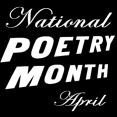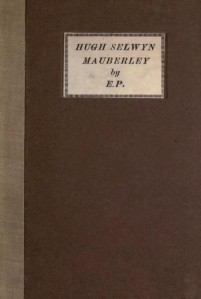Free eBook Review: Hugh Selwyn Mauberley by Ezra Pound
 April is National Poetry Month. We’ve got a display of our favorite poetry books at the front of the library all month, so stop by and check something out. Meanwhile, here’s a short book of poems you don’t have to leave the house for, it’s available free from Project Gutenberg.
April is National Poetry Month. We’ve got a display of our favorite poetry books at the front of the library all month, so stop by and check something out. Meanwhile, here’s a short book of poems you don’t have to leave the house for, it’s available free from Project Gutenberg.

Cover of the 1920 Ovid Press edition of Hugh Selwyn Mauberley
When I read Ezra Pound’s dense, referential poetry I often find myself with absolutely no clue what he’s even talking about. At first encounter, I found this a bit of a shock to the ego. I’m usually pretty confident in my liberal arts education. I mean, it’s never let me down at Trivial Pursuit or armchair Jeopardy. What’s more, I’ve even had the unique opportunity to spend months studying a collection of Ezra Pound’s manuscripts and correspondence while I was getting my masters. Yet, even that barely helps clarify his more pedantic passages, if at all.
But I’ve learned that the trick to reading Pound (and a number of other modernists, for that matter) is to never let them discourage you. No matter how diverse an education you’ve had you’re never going to grasp every reference or read every language used, not unless you do hours of research on each poem. So why bother feeling intimidated? Understanding it all simply isn’t the point. And besides, I’ve grown to like playing catch as catch can with Pound’s references. I like the humbling experience of being a bit baffled. I like being pushed to do some research on his arcane name drops and quotations. Pound is a poet who rewards curiosity and an adventurous attitude towards reading. I think that’s what poetry is all about.
One of my favorites from Pound is Hugh Selwyn Mauberley, mainly because it’s a nice mixture of his more difficult tendencies with some relatively straight forward poetry. The book is only about thirty pages long and broken into two parts. The first grouping of poems is mostly an exercise in autobiography and self criticism. The last poems develop the character of Mauberley: the type of lazy, self-satisfied poet that Pound warns us against in the first section.
Don’t let the scattered phrases in foreign languages get you down. I usually just read right through, picking out whatever I can translate on my own, occasionally using my iPhone to look things up if they seem particularly interesting. If I find myself completely lost I just take a few steps back and re-read. The context clues will almost always give me what I need. And if not the context then the measure, which Pound uses as expressively as any modern poet. The feeling of Pound’s poetry, and his overall meaning, is often pretty intuitive.
I’ll leave you with the entire text of poem IV. It’s about the “lost generation” returning from WWI. Just ignore the Latin phrase from Horace that Pound twists around (from something like “sweet and right it is to die for country” to “for country, not sweet and not right”). You don’t need to know that Pound is echoing phrases from WWI poet Wilfrid Owen either. None of that’s necessary to get all the anger of this poem. It’s clear as day:
These fought, in any case,
and some believing, pro domo, in any case . .
Some quick to arm,
some for adventure,
some from fear of weakness,
some from fear of censure,
some for love of slaughter, in imagination, learning later . . .some in fear, learning love of slaughter;
Died some “pro patria, non dulce non et decor”. .walked eye-deep in hell
believing in old men’s lies, then unbelieving
came home, home to a lie,
home to many deceits,
home to old lies and new infamy;usury age-old and age-thick
and liars in public places.Daring as never before, wastage as never before.
Young blood and high blood,
Fair cheeks, and fine bodies;fortitude as never before
frankness as never before,
disillusions as never told in the old days,
hysterias, trench confessions,
laughter out of dead bellies.
Hugh Selwyn Mauberley is a free eBook available from Project Gutenberg.
Review by Matthew
